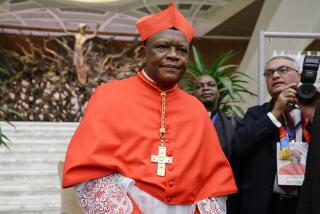China’s Naming of Bishops Angers Pope
ROME — In a sharp escalation of tensions between China and the Vatican, Pope Benedict XVI on Thursday repudiated the unauthorized appointment of two Chinese bishops and indicated that they and the two prelates who ordained them could be excommunicated.
The actions by China’s state-sanctioned church, and the scathing reactions here, undermined what had been a prolonged period of rapprochement between Beijing and the Holy See.
It also marked the most dramatic diplomacy moment yet for Benedict’s year-old papacy.
The pope learned with “profound displeasure” of the ordinations this week in China, Vatican spokesman Joaquin Navarro-Valls said in an unusually tough statement. He said the consecrations represented a “grave violation of religious freedom” that had done serious harm to the unity of the Roman Catholic Church.
Navarro-Valls termed the unauthorized appointments “unacceptable acts of violence and inadmissible coercion.”
The so-called patriotic Catholic Church in China named as bishops Ma Yinglin in the southern city of Kunming on Sunday and Liu Xinhong in the eastern city of Wuhu on Wednesday, neither with Vatican approval.
Authority over the appointment of bishops has long been a matter of great dispute in this religious power struggle.
Navarro-Valls said the two priests, as well as the two bishops who consecrated them, were subject to a provision of the church canon that requires automatic excommunication in cases of ordination performed without papal consent, a severe and rarely enacted punishment.
However, the statement also noted that priests in China operate under “strong pressures and threats,” a possible mitigating circumstance when excommunication is being considered. A decision on disciplinary steps has not been made.
The controversy is a significant setback in recent efforts to improve relations.
China and the Vatican cut ties in 1951, soon after the Communist Party came to power. The Asian giant’s 10 million to 12 million Catholics are divided between the official church approved by the ruling party and an underground church loyal to Rome.
In the last year or so, however, there have been meetings between Chinese and Vatican officials and other overtures aimed at narrowing the differences. Tacit agreement was frequently reached on the naming of bishops, and Benedict’s aides spoke of a possible papal trip to China.
When church officials in Rome expressed dismay over Beijing’s decision, Chinese officials said they were merely trying to fill the many vacancies in the local clerical leadership and follow the will of Chinese worshipers.
The Chinese Foreign Ministry defended the appointments and said Vatican criticism was misplaced.
Liu Bainian, vice chairman of the Chinese Catholic Patriotic Assn., which oversees the pro-state churches, told the Italian news agency Ansa that he did not think the new appointments should derail broader normalization talks with the Vatican.
But Navarro-Valls, the papal spokesman, said the Vatican was alarmed by reports from China that as many as 20 additional bishops could be consecrated without papal blessing. Dialogue between Beijing and the Holy See is at risk, he said.
“The Holy See has, on various occasions, stressed her willingness for honest and constructive dialogue with the competent Chinese authorities for the purpose of finding a solution that would satisfy the needs of both parties,” he said. “Initiatives such as the [unauthorized appointments] do not favor such dialogue but instead create new obstacles against it.”
He said the Vatican had hoped that “such despicable events belonged to the past.”
Excommunication is the church’s sternest punishment and is not ordered lightly. Priests who attempted to ordain women have been excommunicated, as was ultraconservative Archbishop Marcel Lefebvre in 1988 after he refused to recognize major Vatican reforms in the 1960s. He took thousands of Catholics with him in rebelling against Rome.
Some analysts here suggested that China’s abrupt decision to name bishops in defiance of the Vatican came in response to Benedict’s elevation of Hong Kong Bishop Joseph Zen to cardinal this year.
Zen has been an outspoken critic of the communist regime. He said his promotion could make him an important bridge between the Vatican and Beijing. But he has not hesitated to criticize Chinese abuses, including the jailing and persecution of priests and other Catholics.
More to Read
Sign up for Essential California
The most important California stories and recommendations in your inbox every morning.
You may occasionally receive promotional content from the Los Angeles Times.











